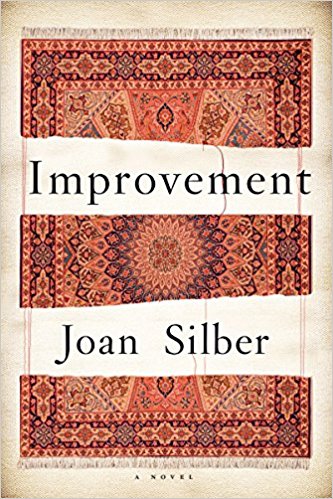Interview with 2018 NBCC Fiction Award Finalist Joan Silber
For the past four years, the National Book Critics Circle has partnered with The New School’s MFA Creative Writing program, allowing the students to interview each of the NBCC Awards Finalists. In addition to building excitement for the Awards Finalist Reading and Ceremony held at the New School March 14th-15th, these interviews have built an intergenerational bridge between the writers of today and tomorrow.
This year, as part of the ongoing collaboration, and in support of the NBCC’s conversation about reading, criticism, and literature that extends from the local to the national, Brooklyn Magazine will publish and promote the interviews between NBCC Finalists and the current students of The New School.

Joan Silber’s Improvement (Counterpoint) delivers a true tapestry of human connection. It is a story about the young New Yorker Reyna, who finds herself in criminal schemes alongside her ex-con boyfriend Boyd, as she struggles to find meaning after encounters of deep guilt and loss. It is a story about Reyna’s quirky aunt Kiki, whose fierce independence guides her youth in 1970s Turkey and whose choices go on to impact generations of families. It is a story about Richmond native Darisse, who seeks a match for her profoundly compassionate nature. This book examines how characters are rolled about by the forces of change and subtly directed into each other’s lives; it is a masterful record of their collective, undeniable growth.
Improvement. That is such a strong title, and it’s a term that comes up a few times within the novel. My favorite is when Darisse mentions her private religion and how she imagines the walls of her bedroom becoming air to form a larger space. She says that is how strength will come to her and how improvement will come to her. Can you talk about that idea of improvement coming from an expansion of space?
Interesting. I didn’t come up with the title right away, I came up with it at the end, after I had written these different strands. But certainly I do think it is the task of a fiction to figure out how you get through the difficulty and natural suffering of experience.
The key improvement in the whole book is that Reyna gets it together to make this act of quixotic generosity and do some good. But certainly, the Darisse chapter is really important to me. I’m interested in self-reliance. I sort of forget that, but it keeps coming up. I created Kiki out of that. But I think it’s also important in a character like Darisse, who certainly seems to be out of resources but we see her with plenty of resources. So I’m definitely interested in that kind of improvement as well. The thing about Darisse is also that she’s really a character of emotional integrity, in her own way. She clings to her feelings for the disappeared Claude in the space of everyone else saying “He doesn’t care about you.” And she does get on with her life, as we always tell people to do. So her sense of improvement with that was important to me.
Love is known by several different descriptions in this book. There’s old love that makes one remember how to be young again, there’s a love that cannot save and has too much asked of it, and there’s buried love with an eternal “zombie life” that will probably never be realized in the present or the future. What do you think is the value to each?
I’m so glad you’re picking these things. The other phrase that’s important and connected to all of those is Kiki thinking that it’s one of the great mysteries of modern life, how people deal with old love. People often don’t stay with their first love, that’s not our form particularly. I think a couple of things about that. She’s trying to explain to Reyna that, yes, I still have feelings for Osman but I don’t want to get back with him. And of course that is echoed more strongly in the book with what happens between her and Boyd.
My agent said they’re never going to get back together, and I actually don’t think they will. I think it’s too hard for Boyd. But it’s still always there, that zombie love. And then there’s that other thing, which I did see when I was training my dog Lucille. I did see dog trainers who advertised saying love is not enough. Apparently it’s a pretty standard thing for dog trainers to say. I think it is true that too much is asked of love in our culture. There’s a quote from E.M. Forster, saying when people don’t have religion anymore, they’re going to rely too much on love and love is not going to be able to do it. It’s not that I don’t believe in love or think it’s unreal or that we should speak meanly of it, but I think too much is asked of it, and not enough of other stuff.
What do you think would be the other stuff?
I think we need larger belief systems. I have a relationship to Buddhism, but not everyone will have that in their pocket. They need something more than their own personal lives to think about. They need a larger sense of the world, whether it’s ethical or religious.
Reyna describes her initial choice to drive the car to Richmond as a “fake decision” because she lied to herself. Dieter, before his marriage, struggles with living a life that feels not entirely his, or not entirely authentic even though no one is forcing him to make certain choices. Do you see learning how to work through habits of self-deception as a necessary trial of youth? Or is it just a necessity of life sometimes?
That’s such a good question. I certainly associate it with youth, because you can’t know when you’re young. You’re trying on different selves. Maybe Reyna is the type of person who could drive that car, maybe that would be thrilling for her. She doesn’t exactly know that, and it’s the pressure of circumstance that forces her to decide, which is the stuff of fiction. But it certainly comes up later. It depends on the circumstances that unveil themselves. And it depends on the nature of the person. Kiki wouldn’t make a mistake like that, Kiki knows who she is. But someone else might.
The book begins with the recounting of Kiki’s life led in Turkey in the 1970s. What spurred that destination as the starting point in the novel?
I’ve been to Turkey three times and I really like it. It’s actually changed a lot in the public imagination since I wrote this book. I had to not glorify it too much. [Pointing to a rug in the foyer] This is a Kurdish rug, and I have a bigger one in the other room. I had been looking for a way to get Turkey into a story. Turkey was important to me because it is the border between Europe and Asia, so it’s the closest place geographically that’s really “the Other.” I didn’t travel to Turkey in 1970, but I know people who did. So I asked them.
And then the story shifts to New York during Hurricane Sandy.
When I was listening to the radio during Hurricane Sandy, there was a report about someone who had visited elderly people in housing projects, because their elevators didn’t work anymore. People didn’t have electricity but they were like, “Oh we’re fine, no problem,” and so I thought a lot about that. My electricity was out. All of downtown was bathed in darkness. It was kind of amazing, you think “Well I’ll just go to the store to get water,” but no the store is all out! But we managed. New Yorkers always manage.
This book plays with time in such a fascinating, intricately connected way. Shifting from generations and between global locations throughout the narrative – was there a specific motivation for that? Can some stories only be told through a mixing of times?
When I was first learning about fiction, there was this positing that everything takes place in crucial scenes and that a story is about how someone changes in one scene, and I never believed that. I always thought that crucial things take a long time to unfold. So I’m always interested in longer spans of time, and I liked doing that. I wrote a book on time and fiction. I’m very interested in long time spans. So I knew I wanted to do that, though I do it less in this novel than I’ve done in other stories. This is a little more contained.
There’s a passage in Part I of the book where Reyna describes how she knows that her relationship with Boyd is quite fragile, and probably not entirely real, but that she is still moved to delight him despite any danger that might approach in the future. She says that she accepts this duality, this simultaneous knowledge of the good and the bad in being with Boyd, “all because of beauty.” Can you expand on that idea? Do you feel that is a common motivation for the other characters in the book?
Oh interesting, Reyna knows there’s some risk in being involved with him. She’s not that in love with him at the time she’s doing the visits [to Rikers]. But then they actually do grow closer through the visits themselves, because there is a particular kind of intimacy in having those visits. But I wanted to have that be “all because of beauty” because I was proposing that we’re always told to be sensible, and there’s a lot of overview of how people conduct their relationships, whether they’re toxic or healthy, whether they’re this or that, and I think there’s a neglect there.
There are things about Boyd that Reyna always finds beautiful, and that’s the difference between sexual love and friendship. Friendship has its beauties too, but we’re not moved by them in the same way. And so I think I wanted to give their relationship credit. And I probably feel that way about all the relationships in the book. I give them credit, for the beauty of them.
Who was your favorite character to write?
Oh! I don’t think I have one, to be perfectly honest. Kiki is probably the one I’m closest to—she’s my age, though her experiences are different [from my own]. But she was hard to work on, when I did the part about her in Turkey, that had the most rewriting. And I love Darisse. I’ve been around home health aides, and I know what they do, and they’re really the angels of our culture. They do amazing things. So I had some admiration for her that I wanted to get in there.
That leads me to my final question. Are you working on another project?
Yes I am! I can’t tell yet whether it’s stories or a novel. I have three pieces that I’m sort of done with, a fourth one that I’m toying with. The first piece, which was already published as a story, has to do with a guy who has a secret marriage. It’s a story a friend told me about someone she knew. It was a husband of a family in New York, and the wife found out through a paternity suit shoved through the door that he had another family she didn’t know about.
You might also like 


























